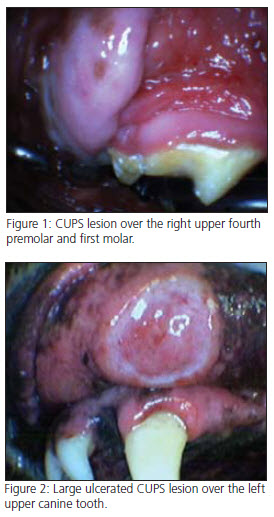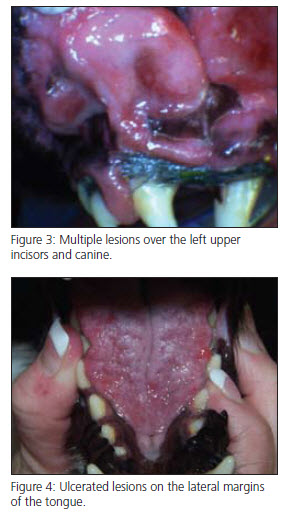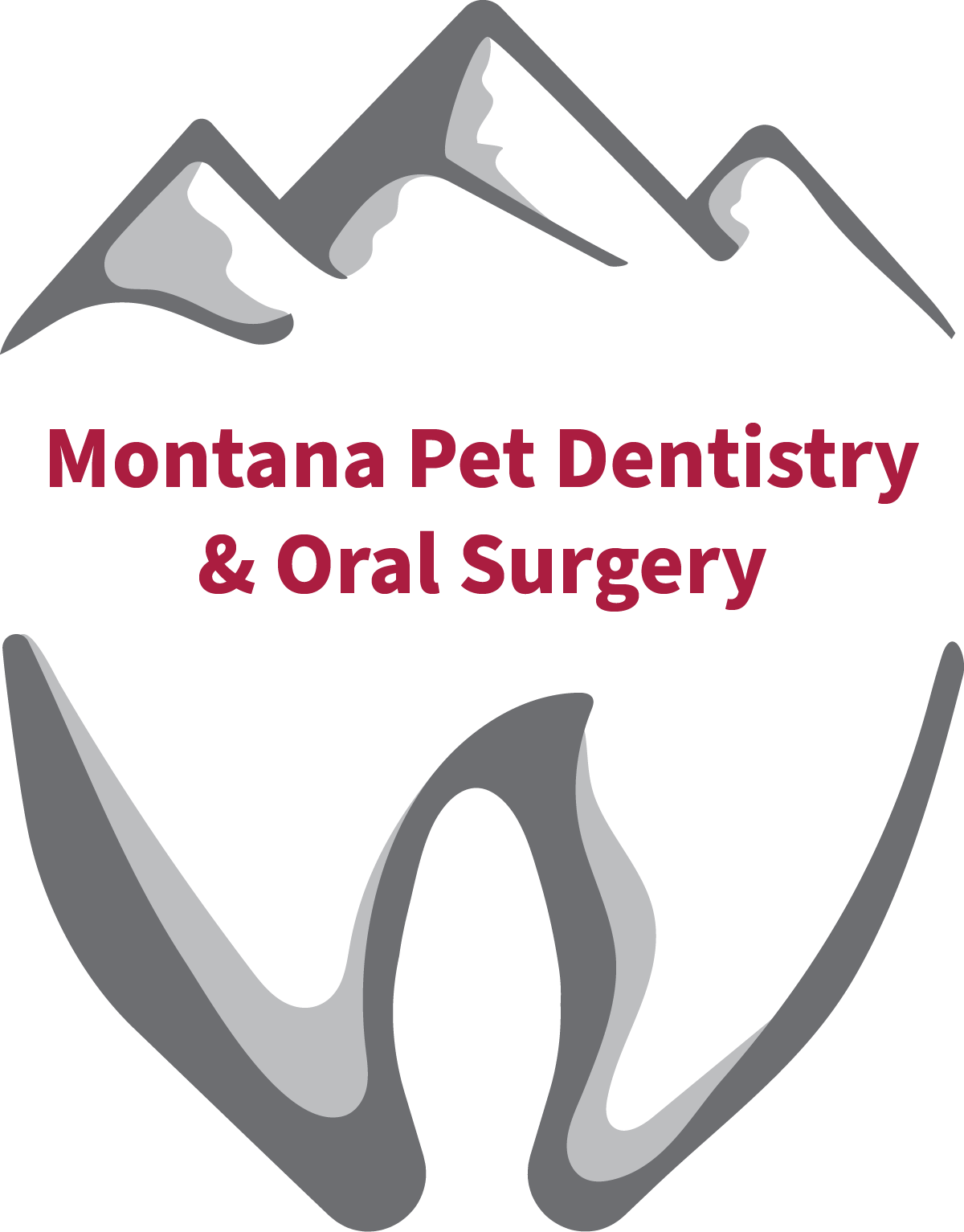 Chronic Ulcerative Paradental Stomatitis (CUPS) is a form of periodontal disease that causes red, raised, ulcerated lesions in the buccal or labial mucosa where the soft tissues rest against the teeth. Any area of the buccal or labial mucosa may be involved, however, most of these lesions are found in the area of the maxillary canines and fourth premolars. CUPS is most common in the Maltese, German Shepherd, Dachshund and Greyhound breeds, but may be seen in any pure or mixed breed dog.
Chronic Ulcerative Paradental Stomatitis (CUPS) is a form of periodontal disease that causes red, raised, ulcerated lesions in the buccal or labial mucosa where the soft tissues rest against the teeth. Any area of the buccal or labial mucosa may be involved, however, most of these lesions are found in the area of the maxillary canines and fourth premolars. CUPS is most common in the Maltese, German Shepherd, Dachshund and Greyhound breeds, but may be seen in any pure or mixed breed dog.
The cause of CUPS appears to be plaque intolerance where the immune defense system mounts a hyperactive response to the bacteria involved in periodontal disease. Diagnosis is based upon the characteristic “ulcerated lesions” in the buccal or labial mucosa where they contact the plaque covered teeth. The plaque is commonly of a soft/creamy consistency. These teeth may show other signs of attachment loss such as gingival recession, periodontal pockets and alveolar bone loss. Most patients present with severe oral malodor and are reluctant to have their mouths examined due to oral pain. In some cases, the lateral margins of the tongue and commissures of the lips are also involved. Biopsy with histopathological evaluation of the lesions can help rule out immune-mediated disease. CBC, blood chemistry evaluation, evaluation of thyroid function and urinalysis should be performed to rule out other possible inciting factors. Bacterial culture and sensitivity of the oral cavity is unrewarding due to the large number of different organisms present in the oral cavity. It is almost impossible to determine which organisms are the true pathogens and many common oral pathogens are difficult to culture without special techniques and media.
 Treatment consists of thorough periodontal evaluation including meticulous dental scaling, polishing, full-mouth dental radiographs, periodontal treatment as indicated and dedicated home care. Many cases have undiagnosed periodontal pockets that were overlooked during dental cleaning. When oral malodor and/or soft tissue inflammation recur soon after a dental cleaning, consider the possibility that some subgingival pathology may have been overlooked. Plaque control is the key to preventing ulcer formation and reducing the overall sensitivity. Antibiotic therapy, pain management and immunosuppressive doses of corticosteroids are required in many cases to control the disease and provide enough comfort so that the owner can start home care. Chronic pulse-antibiotic therapy is not recommended. Optimal home care strategies vary from patient to patient, and may include meticulous tooth brushing, oral rinses, oral gels and wax barrier sealants (OraVet™- Merial). Some patients benefit from dental-type diets such as Royal Canin Dental Diet, Hills T/D, Eukanuba Dental Defense and Purina Dental Diet. Chronic administration of sub-antimicrobial doses of Tetracycline/Doxycycline have been reported anecdotally to be of benefit. Some experimentation is required to find the best combination of products and techniques for each clinical case. In refractory cases, tooth extraction will be required to treat CUPS and provide relief for the patient.
Treatment consists of thorough periodontal evaluation including meticulous dental scaling, polishing, full-mouth dental radiographs, periodontal treatment as indicated and dedicated home care. Many cases have undiagnosed periodontal pockets that were overlooked during dental cleaning. When oral malodor and/or soft tissue inflammation recur soon after a dental cleaning, consider the possibility that some subgingival pathology may have been overlooked. Plaque control is the key to preventing ulcer formation and reducing the overall sensitivity. Antibiotic therapy, pain management and immunosuppressive doses of corticosteroids are required in many cases to control the disease and provide enough comfort so that the owner can start home care. Chronic pulse-antibiotic therapy is not recommended. Optimal home care strategies vary from patient to patient, and may include meticulous tooth brushing, oral rinses, oral gels and wax barrier sealants (OraVet™- Merial). Some patients benefit from dental-type diets such as Royal Canin Dental Diet, Hills T/D, Eukanuba Dental Defense and Purina Dental Diet. Chronic administration of sub-antimicrobial doses of Tetracycline/Doxycycline have been reported anecdotally to be of benefit. Some experimentation is required to find the best combination of products and techniques for each clinical case. In refractory cases, tooth extraction will be required to treat CUPS and provide relief for the patient.
If plaque control efforts do not provide acceptable clinical resolution, definitive treatment of severe cases is removal of the substrate for plaque accumulation: The teeth. This is a radical concept, but the results are usually immediate and dramatic. Almost all dogs respond well and their quality of life is improved when the chronic infection and pain is eliminated. Most of these patients require no long-term medical management, and “act like a new dog” according to the owners. They may need to eat soft food for the rest of their lives, but they do so comfortably.
CUPS is a frustrating disease that requires persistence to control. In many cases, control is not possible despite the best efforts of the practitioner. Owners should be given a guarded prognosis and be notified early on that some cases require dental extractions for resolution of the lesions.
